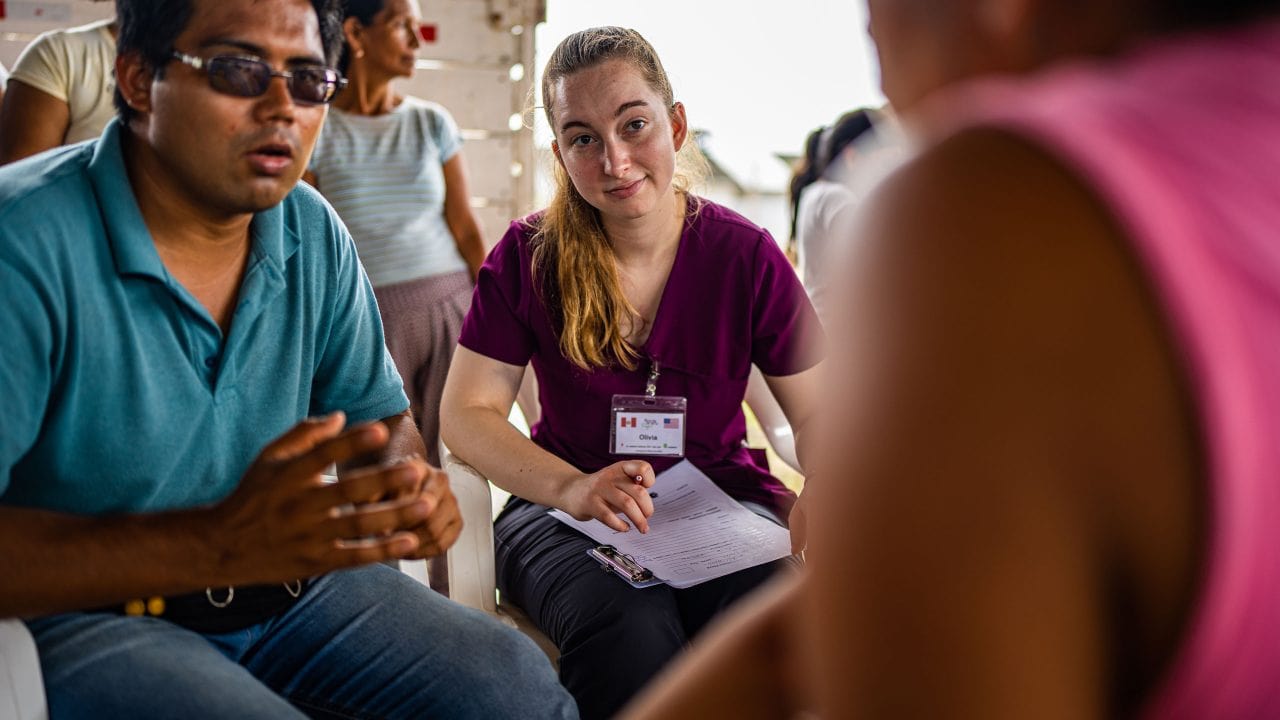
As the departure date for the Union College Global Health Nursing trip grew closer, Olivia Jacobs began to consider backing out. The level-five nursing major felt overwhelmed as she prepared for her finals and her graduation in less than two months.
Although she was excited to travel from the Adventist school in Lincoln, Nebraska, United States to Peru to provide medical care, Olivia was worried that the busyness of the trip would leave her no time to rest before exams.
“It was true I didn’t get to rest over break,” Jacobs said. “But the trip had such a different energy, and it was so encouraging. I came back feeling better, happier, calmer.”
The Peru trip was the culmination of the Global Health Nursing class. In this elective, level four and five nursing students learn how to provide sustainable health care in low-income regions around the world. Nineteen students from the class went to Iquitos, Peru, where they partnered with the People of Peru Project to host clinics throughout the city and in the jungle. During the six clinics, they were able to serve more than 1,000 patients.
At Iquitos, the students took turns examining patients, providing care, and working in the pharmacy. Although People of Peru Project had translators available, several students also spoke Spanish fluently, which helped the group see more patients at once. A local dentist also came to the clinics to provide free dental care.
As patients began to arrive, Jacobs and her classmates had the opportunity to put their nursing training to good use. “We got to apply all these skills we’d been practicing,” she said.
“One of my first patients on the first day had breast cancer,” Jacobs said. She called her professor over to confirm it. They were able to give the woman pain relievers but had to tell her that they had nothing more that would help.
Jacobs said, “Knowing there was nothing we could do was sad. That feeling of frustration sat with me for a while.”
“On our second day of clinics, we had six patients with diabetes come in,” Jacobs said. “My classmate Carlie Hanson’s mother, Marcella Hanson, came with us, and she’s a nurse practitioner who specializes in diabetes treatment and education. She helped us talk about how to control diabetes and how to properly manage diet, exercise, and hydration. It was a ton of education, and patients were saying, ‘Oh, that makes sense. That’s not really what I’ve been doing.’ We felt that we were able to help a lot of people that day, which was nice coming after the day before.”
Many of the patients were suffering from the same common ailments. “If it wasn’t dehydration, it was parasites,” Jacobs said. “You’d have a patient come in saying, ‘I have back pain, I’m not urinating, I have low blood pressure, I’m tired,’ and you’d say, ‘OK, you sound dehydrated.’ So, you’d figure out how to educate them on how much they should be drinking each day, and then your next patient would come in with the exact same complaints.” The students rotated through positions at the clinic so they wouldn’t become burned out and begin missing important symptoms.
The work Jacobs did at the clinic reminded her why she chose nursing as her career. “It put my reason for being in the nursing program back into perspective,” she said. “School matters, yes, but ultimately caring for others is why I’m here. At some point, you can lose your drive and just want to get through so you can get out into the real world, but this trip reminded me that caring for others is what I want to be doing.”
The class spent 11 days working closely together to serve twice as many patients as they expected.
“The relationship building that I experienced over the trip helped me see God,” Jacobs said. “I saw Him in people: in patients, in the people I talked to, in the conversations I overheard. I’ve been telling the nursing students in the lower levels to go, because you learn a lot, and it’s just so good for you.”
The original version of this story was posted by Mid-America Union Conference Outlook.